Are you confused about which fat to buy? Would you like to learn which is the healthiest cooking oil?
The Ultimate Guide To Healthy Fats will guide you through the confusion, ignore the nonsense and marketing mumbo jumbo. You will learn what to use, what to avoid and why.
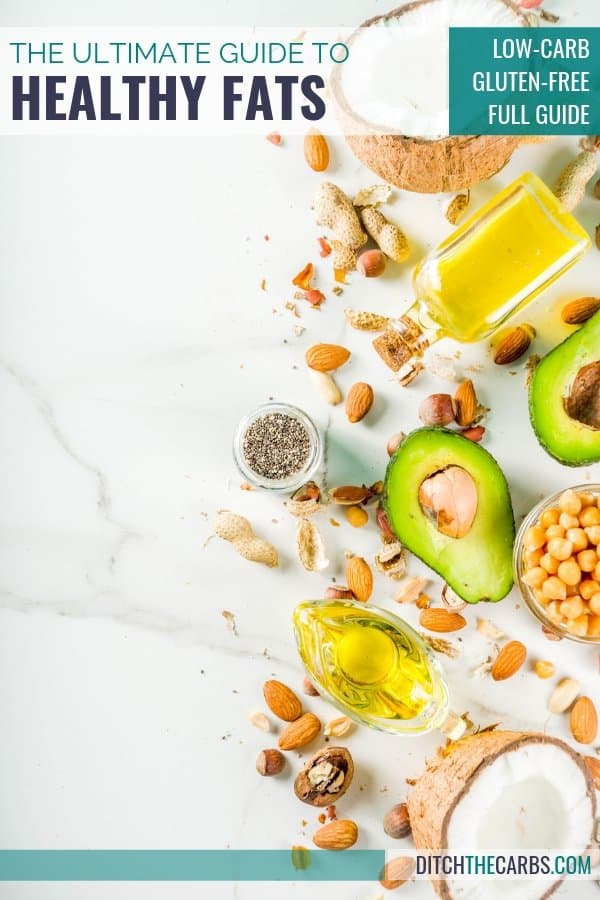
This is a guest post by Michael Joseph who is a passionate nutrition educator with a master’s degree in Nutrition Education. He is the founder of Nutrition Advance where he frequently writes nutrition and health-related articles. He believes that nutrition advice has become overly complicated and that we need to get back to the basics and value our traditional food. Photo credits go to Nutrition Advance.
What Are Healthy Fats?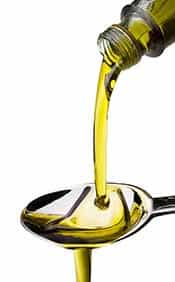
Just what is the healthiest cooking oil?
Are you ready to create the ultimate 12-month blueprint for reaching your health & weight loss goals this coming year?

Our free on-demand video training will walk you through how to make 2024 THE year you set health goals…and keep them.
There is a whole world of cooking oils out there and choosing the healthy option can be very confusing.
Pick up a newspaper, and you’ll hear a dietitian talking about how you should choose ‘heart healthy’ vegetable oils.
On the other hand, read a few online blogs, and suddenly butter seems to be optimal.
The Ultimate Guide To Healthy Fats will reduce the confusion and go through the different types of oil in more detail.
Are Vegetable Oils Good For You?
Public health organizations usually urge us to eat these polyunsaturated oils, but is vegetable oil healthy?
One of the most important points in answering this question relates to the saturated fat content.
We often hear about the benefits of canola and sunflower oil, and perhaps the most familiar soundbite is that they are ‘low in saturated fat.’
Of course, this presumes that saturated fat is inherently bad for us – which it isn’t. In fact, large-scale studies over recent years show that saturated fatty acids have no relation to heart disease risk (1, 2, 3, 4).
So, when you hear people saying about how Canola oil is the healthy choice, remember that these comments are largely driven by a fear of saturated fat.
The irony here is that saturated fats are the best option for cooking due to their heat stability (5, 6).
On the other hand, the majority of vegetable oils are high in polyunsaturated fat — mainly omega-6.
What’s the problem with vegetable oils?
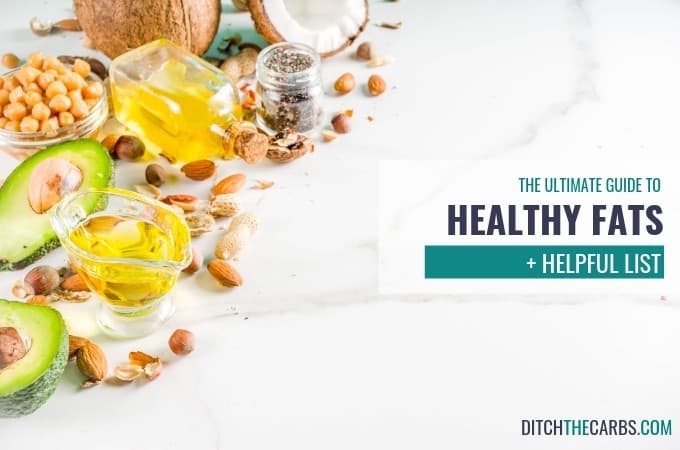
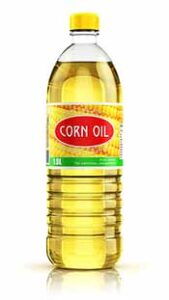
As mentioned above, this vast amount of polyunsaturated fatty acids in vegetable oil causes two major problems:
Polyunsaturated fatty acids are the least heat-stable of all fats, which means the cooking oil has a higher chance of oxidizing. Saturated fats are the most stable and monounsaturated fat comes somewhere in between. (7)
They have a significant amount of omega-6 fat (pro-inflammatory) but very little omega-3 (anti-inflammatory). In other words, regular consumption of vegetable oil imbalances our omega 3-6 ratio and promotes inflammation (8, 9).
With this in mind, if you want the best oil to cook with, then it’s better to stay away from all ultra-processed vegetable oils.
What does “ultra-processed” mean?
Well, if you squeeze an olive or an avocado what happens? Oil comes out.
A significant amount of the coconut, olive and avocado oil that you can buy is naturally cold-pressed.
Try squeezing a rapeseed (used to make canola) or a piece of corn and see what happens. I’m betting that you won’t see much oil!
No, to get oil out of a seed or grain requires a lot more work. To be specific, it involves the use of high-heat presses and the chemical hexane for extraction (10).
Also, the resulting oil looks and smells terrible, so the manufacturers use bleach and deodorizers to make it presentable (11, 12).
If you’re curious, you can see the process of making vegetable oils here:
The Fats To Avoid

Some people call LCHF ‘low-carb, healthy fat,’ and the ‘healthy’ part is essential. While some fats are extremely good for you, others are far from healthy.
To make it easier for you, here’s a list of some of the most unhealthy vegetable oils.
1. Canola oil
Canola oil is one of the most common oils to find in kitchens around the world. However, as shown in the video above, it is not something we want to be putting in our bodies.
2. Corn oil
Corn oil has a few uses – one is for biodiesel, and another is for cooking food. But studies suggest we are better to avoid it and show that it can promote cancer. Corn oil also contains a small level of trans fat, which increases when heated (13, 14).
3. Cottonseed oil
Cottonseed oil is easy to see in various junk food in stores; it’s often used to make trans fat and is one of the very worst oils for health. It’s extremely high in omega-6 and frequently contains pesticides and chemical contaminants used in the cottonseed industry (15, 16).
4. Grapeseed oil
Again, grapeseed oil is very high in omega-6, and the extraction process typically uses hexane. People promoting the oil often claim that it has a ‘high smoke point,’ but this is far less important than the fatty acid composition.
5. Margarine
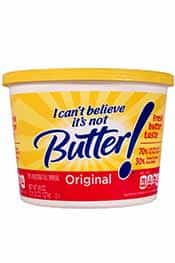
Unbelievably, margarine once held the status of a ‘healthy butter substitute.’ For anyone with interest in business, this is an excellent example of what marketing can achieve.
The truth is, margarine is a horrible industrial food that still contains some trans fat and appears to increase the risk of heart disease (17, 18)
Thankfully, people are now swapping margarine out and going back to butter.
6. Peanut oil
The nutritional profile of peanut oil is better than most vegetable oils, as it is mainly monounsaturated fat rather than polyunsaturated omega-6 (19).
However, in most cases, peanut oil is the result of a harsh chemical extraction process and is better to avoid.
7. Safflower oil
Extremely high in omega-6 oil, this industrial product is another to avoid. In a study that replaced saturated fat with safflower oil in CVD patients, the result was higher mortality (20).
8. Soybean oil
Soybean oil is also highly refined and a significant source of omega-6. Recent studies even show it as “more obesogenic and diabetogenic than sugar” (21).
9. Sunflower oil
Similar to peanut oil, sunflower oil has more monounsaturated fatty acids and is better than most oils on this list. However, it still contains a reasonable amount of omega-6 and is usually industrially processed.
On the other hand, if you can find cold-pressed high OLEIC sunflower oil, then that one isn’t too bad. It’s very low in polyunsaturated fats and has the same fatty acids as found in olive oil, meat and lard (22).
All in all, these oils are highly processed and damage the body.
How To Choose a Cooking Oil

Many people promote the ‘smoke point’ of oil as the most essential factor.
However, this is far from the most important thing to consider.
It’s common sense not to let the food smoke, and if we emphasize lower heat cooking, then this will never be a problem.
In reality, the most important thing to consider is the type of fatty acids in the cooking oil.
Saturated Fats
Saturated fat is found in animal products, as well as tropical fats (coconut and palm oil).
All fats are made of carbons and surrounded by hydrogen atoms.
Saturated fats have no double bonds, and the carbons are fully surrounded (saturated) by hydrogen. This saturation gives the fat higher stability against oxidative damage.
Saturated fats are therefore the most heat stable and the best choice for high heat cooking.
Read more: Low fat vs low carb
Monounsaturated Fats
Monounsaturated fats are a little different in that they have a single double bond. This bond makes them slightly less resistant to oxidation compared to saturated fats.
However, these fats tend to be extremely high in antioxidants and polyphenols which help protect the fat against oxidative damage.
Overall, they are relatively stable during cooking.
Polyunsaturated Fat
Polyunsaturated fats contain more than one double bond, which makes them the most prone to oxidation.
It is best never to heat polyunsaturated fats.
Why is Oxidation Bad?
So, what’s the big problem if heat oxidizes our cooking oil?
Well, oxidized fat causes inflammation in the body, which has links to almost every modern chronic disease (23).
In particular, chronic inflammation increases the risk of Alzheimer’s, cancer, diabetes, and heart disease (24, 25, 26, 27).
Oxidation can turn good oil into an unhealthy one.
What Are Good Vegetable Oil Substitutes?
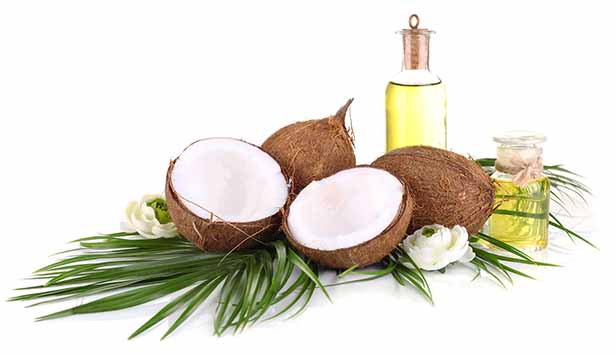
So, maybe now you’ve decided that your omega-6 vegetable oil isn’t the best option, but how can you replace it?
The good news is that if you’re looking for a replacement for vegetable oil, there’s a huge range of choice.
Here is a quick list of healthier choices for cooking:
- Avocado oil
- Bacon fat
- Butter
- Coconut oil
- Extra virgin olive oil
- Ghee
- Goose fat
- Lard
- Red palm oil
- Tallow
All of these fats are very natural, either coming from animals or plants without needing vast industrial production processes.
Just a quick note regarding red palm oil: while it is a healthy source of fat, look for a certified sustainable source. Sadly, many palm oil products are unsustainable and result in widespread deforestation and the destruction of natural habitats (28).
Choosing the Right Fat
Precisely which fat you choose may depend on the situation and, if following a recipe, may involve making smart recipe substitutions.
For example, the best fat for baking would be butter or ghee. So, if you see vegetable oil or margarine in a recipe, you can use butter as a healthy substitute for it.
If you want the tastiest food possible, then bacon fat, lard, or goose fat is hard to beat.
And if you’re making a salad, then extra virgin olive oil is the king (with a bit of balsamic vinegar of course!)
In other words, there may be a difference between the healthiest cooking oil and the best fit for each recipe.
The Healthiest Cooking Oil: My Top 5
In no particular order, here are five contenders for the ‘healthiest cooking oil’ title.
I use these different oils depending on the situation, and they are all delicious as well as healthy.
All nutrition data is based on a per 100g basis and sourced from the USDA.
Avocado Oil
Saturated Fat: 12g Monounsaturated Fat: 71g Polyunsaturated Fat: 13g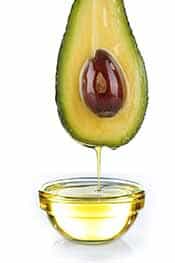
The Good
- High in beneficial antioxidants such as proanthocyanidins and carotenoids. These compounds support our overall body health and help with everything from eyesight to cardiovascular health (29, 30).
- While not a saturated fat, avocado oil is high in monounsaturated fatty acids and polyphenols; this gives it excellent resistance to high-heat cooking (31) .
- Various studies show that avocado oil protects against oxidative stress (32, 33).
- Avocado oil has a neutral taste, so it’s a great choice for many dishes (such as homemade mayo).
The Bad
- The price: if it were not so expensive, then avocado oil might be the perfect oil. Because of its high cost, I favour olive oil.
Coconut Oil
Saturated Fat: 87g Monounsaturated Fat: 6g Polyunsaturated Fat: 1.8g
The Good
- Coconut oil is 87% saturated fat, and this makes it very heat stable, so it’s the healthiest oil for cooking (34, 35).
- Lauric acid is one of the primary fatty acids in coconut oil. Notably, lauric acid has antimicrobial properties and can protect the body against infection, bacteria, and other dangerous pathogens (36).
The Bad
- Some people find that coconut oil gives their food a coconutty taste and prefer a blander flavor. However, others (including myself) don’t notice this.
Ghee
Saturated Fat: 51.4g Monounsaturated Fat: 21g Polyunsaturated Fat: 3g
The Good
- For me, it’s the best-tasting fat in the world. Imagine butter but with a deeper, richer, and creamier flavour. It tastes delicious in these keto crepes.
- Ghee doesn’t contain any lactose (dairy sugars) or proteins – it’s pure fat. As a result, it is much less prone to burning than butter.
- Ghee provides a source of conjugated linoleic acid and fat-soluble vitamins A, D, and K. All of these compounds are essential for good health. Grass-fed ghee especially has these nutrients in greater qualities. (37, 38)
The Bad
- The price: due to the extra time requirements, ghee is much more expensive than butter.
Extra virgin olive oil
Saturated Fat: 14g Monounsaturated Fat: 73g Polyunsaturated Fat: 11g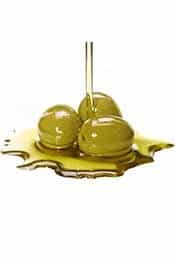
The Good
- A wealth of studies shows that olive oil is protective of the cardiovascular system (39, 40, 41).
- Similar to avocado oil, olive oil comes packed with health-protective polyphenols (42).
- Despite various myths that extra virgin olive oil is not suitable for heating, it’s one of the most heat-stable oils (43, 44).
- It gives food a great flavour.
The Bad
- Be careful to choose a reputable olive oil brand. It’s rather shocking, but some dodgy manufacturers cut some olive oils with cheaper vegetable oils to increase profits (45, 46).
Lard
Saturated Fat: 27g Monounsaturated Fat: 35g Polyunsaturated Fat: 9g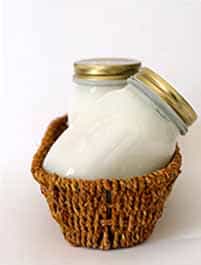
The Good
- Do you know the fat in olive oil that everyone calls “heart healthy”? Well, the name is oleic acid – and it’s also the primary fatty acid in lard (47, 48).
- It gives food an incredible taste.
- Lard is full of beneficial fat-soluble vitamins and omega-3; again, these amounts are higher in lard from grass-fed animals.
- Saturated fat and monounsaturated fat are the main constituents of lard. Therefore, it is resistant to oxidation at high-heat temperatures.
The Bad
- It can be difficult to find, depending on where you live.
Final Thoughts
While cooking oils from natural sources are healthy, the opposite is true for industrial vegetable oils.
Along with sugar and refined carbohydrate, these vegetable oils are some of the worst things you can possibly eat.
It’s also worth remembering that high heat cooking is not the healthiest cooking method. But when you do cook at high heat, using the fats in this article will make the food that much healthier.
Additionally, you can make all foods even more resistant to oxidation by using herbs such as rosemary and turmeric.
To sum up, the most important point to remember is to opt for a natural fat that contains predominantly saturated or monounsaturated fatty acids.

Get our FREE guide to finally fix your metabolism!
Losing weight & getting healthy is never easy, but lately you might feel like it’s suddenly become impossible.
Our Flip the Switch guide will help you clearly understand what’s been going on, as well as exactly what you can do to get your metabolism working again so that you can look and feel your best—it’s easier and more simple than you think!










Very interesting information about the difference in oils! Thanks so much!
Great guide. Lots of great tips
What oil would you recommend for a deep fryer. I need one that does not harden at room temperature, but hardens in the fridge. I have completely switched over to butter, coconut oil, and olive oil for cooking and baking.
I continue to deep fry with peanut oil, only about 2x a month though.
Do you have any thoughts?
Thank you
Judy
We use coconut oil in our fryer and it works great!
What about dairy? Should it be avoided? It is so hard to avoid cheese and I see heavy cream in some recipes.
We all LOVE full fat dairy here. In fact, full fat dairy is discussed in this post, by the World Heart Federation president, Salim Yusuf. He presented the data from the PURE study on diet and cardiovascular disease. “There is ZERO evidence to encourage low-fat dairy products. The saturated fat that comes from full fat dairy may be protective”.
I’m stunned at this evidence, especially that cooking/heating olive oil is far healthier than useing rapeseed … i feel like I’ve been conned all these years. In fact i feel quite angry about it all.
Thank you Libby for such s fabulous web site, with excellent content. I love your recipes and have enjoyed many of your videos this month too.
Thank you Jane. Yes I too feel we have been conned. Sadly the current food pyramid and guidelines have actually caused the current health crisis and we have inadvertently been part of a huge experiment that began because of poor science and the egos of certain founding scientists and politicians.
Hi Libby, Thanks so much for all of us out here in computer land. There was a lot of info and sorry if I missed it but where does ricebran in good/bad. I love baking and start this low carb journey for family and friend needs but as for me I hard my gall bladder out and are fat intolerant and have found rice bran works best for me.
Thank you for this very informative information about the different oils. I am curious as to why I am blocked from seeing the video ‘How its Made – Canola Oil’. I saw it some months ago on this website and was appalled at the processing that goes on to achieve what is touted as ‘healthy oil’! How ignorant we are kept of what really goes on with our so called manufactured ‘food’! Thank goodness for websites like yours Libby that inspire and help us know a better way of eating and living!
Thanks for the info, it looks like that YouTube channel has updated it’s Privacy Settings. I’ve found another link and uploaded that for you.
We use a Aldi’s olive oil cooking spray for daily morning eggs. Is this the same as extra virgin oil from the bottle? Also how do we know what is a reputable brand of ev olive oil?
I understand there are fake olive oils coming onto the market, especially as consumers are swapping from seed oils (sunflower, rice bran, canola etc) to olive oil. I can’t tell you about specific brands, as they change regularly but if you Google “fake olive oil brands UK” you can see up to date lists there.
Thank you for touching the subject that processed vegetable oils are loaded with free radicals!
Libby, can you tell me what olive oils to use for salads vs. cooking?
Hi Sharon, I use extra virgin olive oil for salads and cooking, as long as it doesn’t get to smoking point, which mine never does. I use lite/mild flavoured for making my 1-minute mayonnaise. For other cooking such as roast dinner,s I often use coconut oil or lard.
Love this article. It is crazy that the video on how canola is made mentions that it is high in omega 3 when it is definitely not. But catch phrases win the races. Haven’t touched that garbage in years. Too bad we never know what’s in the restaurant food.
I ask the waiters what oils they cook with – it’s nearly always Canola. Very occasionally they’ve agreed to cook me a steak in butter. Worth asking! 🇳🇿
After being low carb for a couple of years, at my husband’s request I’m beginning to learn about the inflammatory properties of oils. Is the lard that Wal-Mart sells a good option? It lists both lard and hydrogenated lard as ingredients, as well as a few preservatives.
I am 67 years old and feel like I have been totally brainwashed for years and years! There is just so much conflicting info on the internet! Ex. canola oil is good for you, canola oil is really bed for you! UGH! My brain keeps telling me that people have used olive oil, butter, lard, etc. for thousands of years, but doctors, the media, the AHA keep brainwashing us into believing that they will kill us—vegetable oil is a much better choice. I keep a jar of bacon fat in the fridge for frying and scrambling eggs. Nothing tastes better! I recently roasted marrow bones for soup and got a nice bit of fat from the process. But I feel GUILTY cooking with it! Isn’t that crazy? I render the fat from making chicken stock and freeze it in ice cube trays. I did a daring thing a couple of weeks ago and used it instead of butter to make biscuits! They were to die for (I hope not literally ((as the little voice from the AHA whispers in my ear!))) Thank you for the list at the end of this article. It makes things much easier!
Thanks for the information!!